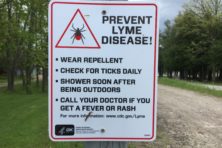Article posted Thursday, October 30, 2014 1:24pm
- Share
- Tweet
- Pin
- Share
The phrase “transgenerational epigenetic imprints” is one that is making headlines in the scientific world. In simple terms it means that the environment can bring about changes in the DNA of a male or female parent that can be transmitted to subsequent generations. For example, a child who knows nothing of elevators but has a parent who is fearful of riding in an elevator, can have an aversion to them. And this same aversion appears in subsequent generations. Or a female rat exposed to a certain noxious chemical may produce offspring that react negatively when exposed to this chemical. This aversion to the chemical is also shown by subsequent generations. In a recent study mouse parents learned to associate the scent of orange blossoms with an electric shock. The offspring of these parents and several subsequent generations all cringed when exposed to the odor of orange blossoms in the absence of electric shock. It appears that parental genes coding for orange blossom scent was modified such that it became associated with the fear response. In other words, the fear was inherited. (Dias and Ressler, 2013, J. of Nature Neuroscience, Feb. 16; Crews et al, 2007, Proc. of the National Academy of Sciences, March 26)


